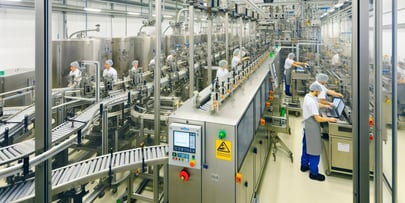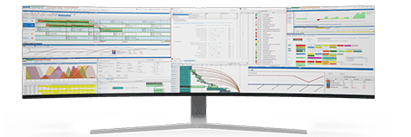Flexible Manufacturing Systems (FMS)
With fluctuating consumer demands, evolving regulatory requirements, and increasing competition, production schedulers are faced with the daunting task of optimizing efficiency while maintaining flexibility in food and beverage manufacturing.
In this blog, we look into the transformative potential of Flexible Manufacturing Systems (FMS) and how they revolutionize the production landscape, especially when integrated with leading Manufacturing Execution Systems (MES) solutions like PlanetTogether APS.

The Role of Flexible Manufacturing Systems (FMS)
Flexible Manufacturing Systems, or FMS, represent a paradigm shift in production methodologies. At its core, FMS is a highly automated and versatile production system capable of adapting to varying product specifications and production volumes with minimal downtime. Unlike traditional manufacturing setups, where each production line is dedicated to a specific product or process, FMS enables the seamless transition between different products or configurations, offering unparalleled agility.
Key Components of FMS:
Modularity: FMS is characterized by its modular design, comprising interconnected workstations, robots, conveyors, and other equipment. These modules can be reconfigured or repurposed swiftly to accommodate changes in production requirements.
Automation: Automation lies at the heart of FMS, driving efficiency and precision. Automated material handling, robotic assembly, and real-time monitoring streamline operations while reducing human error and labor costs.
Integration: FMS thrives on seamless integration with other systems within the manufacturing ecosystem. From ERP and SCM platforms to MES solutions, integration ensures synchronized data flow and enables informed decision-making across the production chain.


Flexible Manufacturing Systems (FMS) and PlanetTogether
Flexible Manufacturing Systems (FMS) and PlanetTogether Advanced Planning and Scheduling (APS) software play critical roles in modern manufacturing environments.
Here's how they contribute to enhancing production efficiency and adaptability:
Flexible Manufacturing Systems (FMS)
1. Adaptability:
FMS allows for quick changes in production to adapt to customer demands without significant downtime. This flexibility is achieved through the use of computer-controlled machines that can be quickly reprogrammed to manufacture different products.
2. Reduced Lead Times and Inventory:
By enabling efficient production runs of varying sizes, FMS can significantly reduce lead times. This system also minimizes inventory levels by facilitating just-in-time manufacturing, which aligns production schedules with demand forecasts.
3. Enhanced Quality Control:
Automated systems within FMS monitor production processes in real time, allowing for immediate corrections and reducing the rate of defective products. This automation ensures consistent quality across all items produced.
4. Increased Productivity:
FMS machines operate continuously and can be quickly switched from producing one item to another, maximizing machine utilization and throughput without the need for extensive downtime for setup changes.
PlanetTogether APS
1. Optimized Scheduling:
PlanetTogether APS provides powerful tools for planning and scheduling that optimize the use of available resources, such as machinery, labor, and raw materials. It considers constraints and priorities to create a balanced and achievable production schedule.
2. Real-Time Visibility:
The software offers real-time visibility into the production process, allowing managers to monitor progress and quickly react to disruptions or changes in demand. This visibility helps in maintaining continuous flow and meeting delivery targets.
3. Integration with ERP Systems:
PlanetTogether APS can be integrated with existing ERP systems, allowing for seamless information flow across different departments. This integration helps in maintaining accurate data for inventory, orders, and production, facilitating better decision making.
4. Scenario Planning:
The software allows managers to simulate different production scenarios to determine the best strategies for meeting production goals. This feature is crucial for effective risk management and strategic planning in an uncertain market environment.
When Flexible Manufacturing Systems (FMS) and PlanetTogether APS are integrated, manufacturers can achieve a highly responsive and efficient production system. The synergy between the flexible physical production capabilities of FMS and the advanced scheduling and optimization features of PlanetTogether APS creates a robust framework for managing modern manufacturing challenges.
This combination not only drives operational efficiency but also enhances the ability to respond to market changes swiftly, maintaining competitiveness in dynamic industries. Overall, the role of FMS and PlanetTogether APS in modern manufacturing is foundational, providing the tools necessary to achieve high levels of efficiency, flexibility, and responsiveness required in today's fast-paced market.
By embracing Flexible Manufacturing Systems (FMS) and harnessing the power of integration, production schedulers can steer their organizations towards sustainable growth and competitive advantage in the years to come. Are you ready to take your manufacturing operations to the next level? Contact us today to learn more about how PlanetTogether can help you achieve your goals and drive success in your industry.